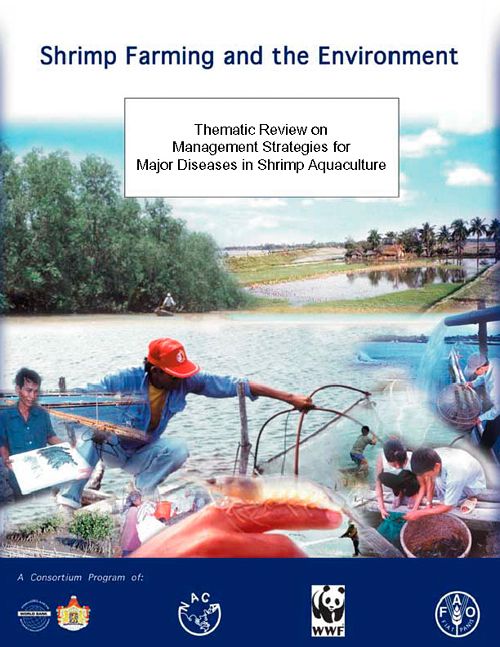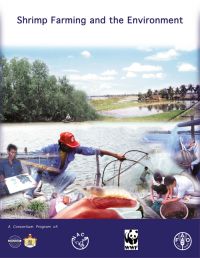Thematic review on management strategies for major diseases in shrimp aquaculture
31 May 2005 | R.P. Subasinghe, J.R. Arthur, M.J. Phillips and M.B. Reantaso | 1111 Downloads | .pdf | 2.09 MB | Better management practices, Governance and Policy, Health and Biosecurity, Shrimp, Environment and Sustainability
This document presents the report of the Expert Workshop on Management Strategies for Major Diseases in Shrimp Aquaculture, a component of the WB/NACA/WWF/FAO Consortium Program on Shrimp Farming and the Environment. The Expert Workshop was jointly organised by FAO’s Inland Water Resources and Aquaculture Service, the World Bank (WB), the Network of Aquaculture Centres in Asia-Pacific (NACA), and the World Wide Fund for Nature (WWF) and was held from 28-30 November 1999 in Cebu, Philippines.
Included are summaries of 15 country review papers (5 countries from the Latin American Region: Ecuador, Honduras, Nicaragua, Panama, and Peru; and 10 countries from the Asian Region: Australia, Bangladesh, India, Indonesia, Malaysia, Philippines, P.R. China, Sri Lanka, Thailand and Vietnam) on the history and current national status of major shrimp diseases, including their socioeconomic impacts and an evaluation of the successes and failures of state and private sector interventions to solve major disease problems and to develop more sustainable shrimp culture industries.
Also included are summaries of the discussions and recommendations arising from four expert working groups dealing with (i) national and regional policies, legislation, and regulatory frameworks for reducing the risks of trans-boundary disease outbreaks in shrimp aquaculture; (ii) industry management and technological requirements for reducing the risks of disease outbreaks and increasing productivity and sustainability; (iii) specific recommendations for the adoption of programs to control the trans-border transmission of shrimp diseases; and (iv) improving responses to disease problems and management of risks of diseases in the small-scale livelihood sector.
Summaries of four broad thematic reviews presented at the workshop are also included: (i) movements of fish and shellfish: pathogens, issues and avenues; (ii) dealing with disease outbreaks: an industry perspective; (iii) knowledge and experience in trans-boundary movement of aquatic animal pathogens: the roots, impacts and implications for aquaculture and aquatic biodiversity, and options and interventions available for mitigating such impacts; and (iv) species introductions, international conventions and biodiversity impacts, prospects and challenges.
The report summarises the major recommendations arising from the Expert Workshop, laying groundwork for a subsequent Latin America/Asia inter-regional meeting on shrimp diseases funded by APEC, held in Puerta Vallarta, Mexico on 24-28 July 2000.
Copyright, all rights reserved.

